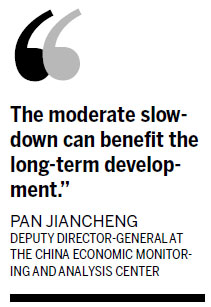Producer prices still declining
Updated: 2013-05-10 07:04
By Chen Jia in Beijing and Yu Ran in Shanghai (China Daily)
|
||||||||
"Large enterprises have sufficient funds to upgrade products following the economic restructuring requirement from the central government. Small businesses like ours feel a heavy burden and can only wait for a recovery."
The PPI decrease is in line with the weaker manufacturing Purchasing Managers' Index, which stood at 50.6 in April, down from 50.9 in March, showing a modest expansion in the industrial sector.
Baoshan Iron & Steel, China's biggest steelmaker listed on the Shanghai Stock Exchange, said on Thursday it will cut its main steel product prices for June bookings, the first price fall after nine months, saying it is worried about future orders.
Wu Jile, manager of a steel producing company in Shanghai, which did not want to be named, said: "The government's tightening of infrastructure construction credit has lagged the start of new projects, which directly cuts the demand for raw materials, especially for steel." An effective solution is to encourage mergers and acquisitions in the industry where there is excessive production capacity, to improve market concentration and competitiveness, Wu added.
Instead of fast expansion, the government has vowed to focus more on growth quality, settling the structural reform budget for the year on Monday and highlighting 11 areas, including fiscal, financial and social welfare systems.
Pan Jiancheng, deputy director-general at the China Economic Monitoring and Analysis Center under the NBS, said the earlier rapid growth of investment caused excessive production capacity, especially in heavy industry.
"The moderate slowdown can benefit the long-term development, and reduce pressures on resources and the environment," he said.
Wolfhart Hauser, chief executive officer of Intertek Group, a global quality and safety service provider for industrial and consumption goods producers, with headquarters in London, said: "China is changing. That doesn't mean there will be less production, but it will move to a higher quality level.
"The trend is in line with economic development, and a lot more companies from China will develop good brand names based on quality and technological innovation."
On Thursday, Barclays Capital lowered the full-year CPI inflation forecast to 3 percent from 3.2 percent, in view of lower-than-expected food inflation and subdued nonfood prices.

"We think the current accommodative monetary and financing conditions will be maintained, considering the softer-than-expected domestic and global growth recovery," a report from Barclays Capital said. "But moderate food inflation and falling global commodity prices have allowed the People's Bank of China to be more flexible."
The report warned that the government should prevent a further rise in fiscal and financial risks, and prevent asset bubbles.
Zhu Haibin, chief economist at JPMorgan in China, predicted that the central bank is likely to maintain the current interest rates and reserve requirement ratio this year.
"The key adjustment of the monetary policy is to manage liquidity in the financial system," Zhu said.
The People's Bank of China, the central bank, said in its quarterly report on Thursday, "The fundamental of Chinese economic growth in the long term doesn't change, and it will maintain stable development supported by macroeconomic policies and structural reform measures."
Policies should be proactive to stabilize inflation expectations, as prices may rebound rapidly when demand expands, the report said.
The PBOC decided to maintain a prudent monetary policy, to balance economic growth, control inflation and prevent systemic financial risk.
Policy will focus on improving growth quality and efficiency, and guiding moderate credit growth, it said.
Xinhua contributed to this story.

 Michelle lays roses at site along Berlin Wall
Michelle lays roses at site along Berlin Wall
 Historic space lecture in Tiangong-1 commences
Historic space lecture in Tiangong-1 commences
 'Sopranos' Star James Gandolfini dead at 51
'Sopranos' Star James Gandolfini dead at 51
 UN: Number of refugees hits 18-year high
UN: Number of refugees hits 18-year high
 Slide: Jet exercises from aircraft carrier
Slide: Jet exercises from aircraft carrier
 Talks establish fishery hotline
Talks establish fishery hotline
 Foreign buyers eye Chinese drones
Foreign buyers eye Chinese drones
 UN chief hails China's peacekeepers
UN chief hails China's peacekeepers
Most Viewed
Editor's Picks

|

|

|

|

|

|
Today's Top News
Shenzhou X astronaut gives lecture today
US told to reassess duties on Chinese paper
Chinese seek greater share of satellite market
Russia rejects Obama's nuke cut proposal
US immigration bill sees Senate breakthrough
Brazilian cities revoke fare hikes
Moody's warns on China's local govt debt
Air quality in major cities drops in May
US Weekly

|

|







